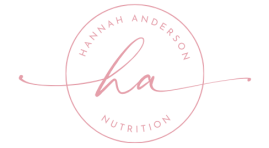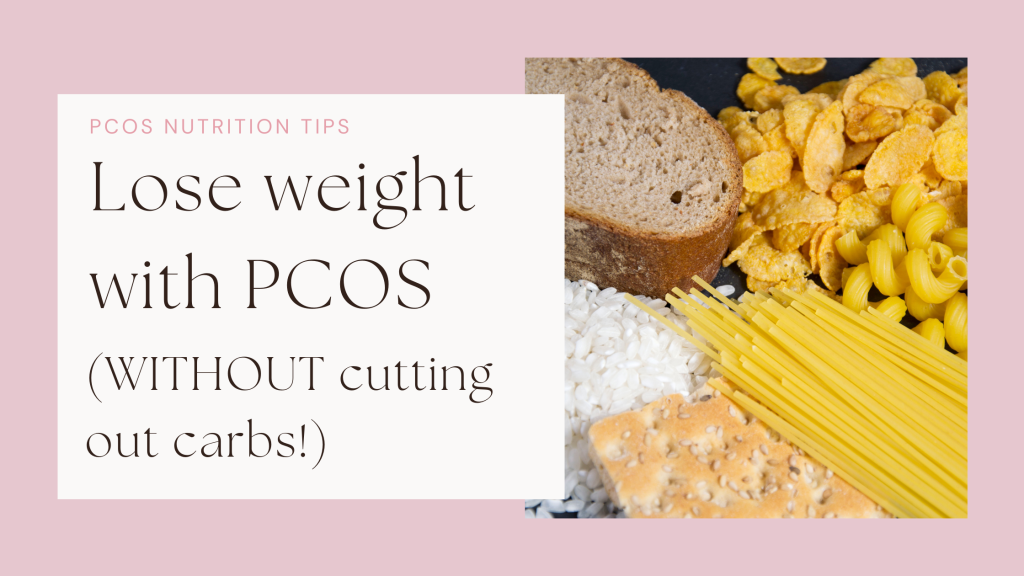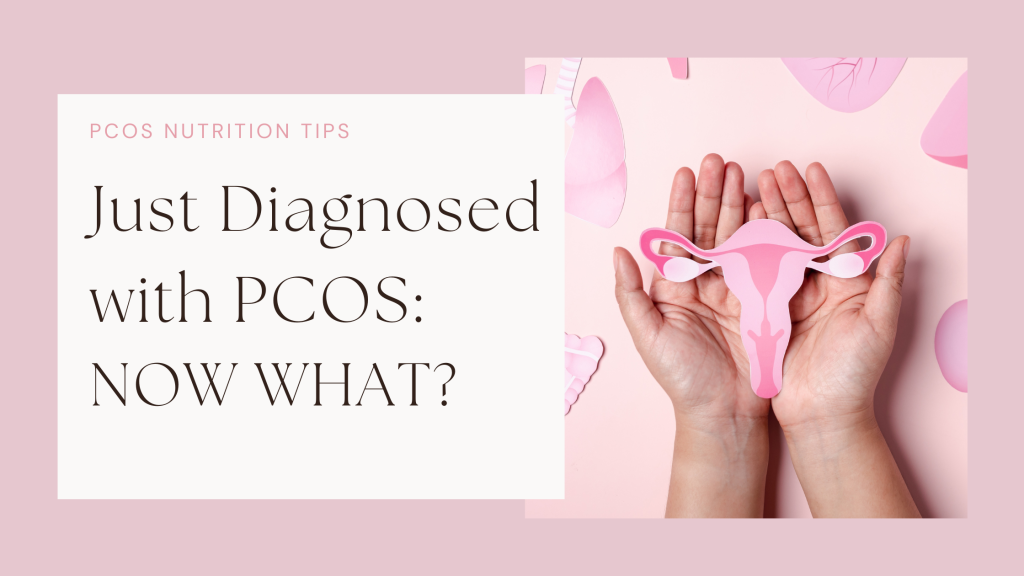If you’ve been diagnosed with PCOS, you’ve likely been told to “eat healthier” or “avoid processed foods.” But this might leave you wondering what eating for PCOS actually looks like?!
As a registered dietitian who has PCOS myself, I’ve seen firsthand how the right dietary strategies can transform symptoms, boost energy, and even improve fertility. But there is a LOT of misinformation floating around these days about what those dietary strategies should be…
With this article, I want to break through the confusion of eating for PCOS so you can feel and look your best! Let’s break it all down into practical steps you can start today!
This post contains affiliate links. This means that if you click on the link and purchase the item, I may receive an affiliate commission at no additional cost to you. Thanks for your support so I can keep creating valuable content like this post.
What is PCOS?
Polycystic Ovary Syndrome (PCOS) affects an estimated 6-12% of women of reproductive age, making it one of the most common hormonal disorders and leading causes of female infertility.
It’s a complex condition that involves a range of symptoms, including irregular periods, excess androgen levels (male hormones), and polycystic ovaries.
These symptoms can lead to challenges like insulin resistance, weight gain, infertility, acne, and hair growth in unwanted areas (Teede et al., 2018).
Because of its multifaceted nature, there isn’t a one-size-fits-all solution—but nutrition plays a key role in managing PCOS symptoms naturally.
Why Nutrition Matters for PCOS
Two common underlying drivers of PCOS include insulin resistance and inflammation, and both can be addressed through what you eat! This means nutrition can play a HUGE role in helping you naturally manager your PCOS symtoms.
A well-balanced diet tailored to PCOS can:
- Regulate menstrual cycles
- Reduce androgen levels
- Support weight management
- Improve energy levels
- Enhance fertility (Moran et al., 2013)
Many of my clients have found that simple shifts in their eating patterns lead to significant improvements.
And eating for PCOS does not have to bland or complicated! Want proof?! One of my clients told me recently, “I didn’t think it would be this easy and I love that I’m eating foods I actually enjoy!”
Do You Need to Avoid Gluten and Dairy with PCOS?
If I had a nickel for every time I heard someone say you need to avoid gluten and dairy if you have PCOS, I’d be going into early retirement! But do woman with PCOS actually need to go gluten and dairy free to manage their symptoms?
The answer often depends on individual tolerance and symptoms. But let’s dive into the science!
Gluten and PCOS
Contrary to popular belief, there’s NO scientific evidence that all women with PCOS need to avoid gluten. (Seriously, go search “gluten and pcos” on PubMed. Nothing!)
This advice is clearly not evidence-based. But that doesn’t stop so many self-proclaimed health gurus and influencers from claiming that gluten causes increased inflammation which can worsen PCOS. This claim is false!
Yes, people might see decreased inflammation numbers when they switch to a GF diet, but this is likely due to the foods they have now added into their diet vs the foods they have cut out! (As I often tell my clients, the issue is usually more what you aren’t eating than what you are!)
ONLY those with celiac disease or a true non-celiac gluten sensitivity (NCGS) will experience increased inflammation when eating gluten. And this is very small percentage of woman with PCOS!
Yes, a lot of women with PCOS do report feeling better when they reduce gluten intake, BUT this is likely due to a more overall balanced diet, eating more vegetables, ect. NOT because they have removed gluten from their diet.
So yes, if you suspect gluten may be causing issues, try eliminating it for a short period and monitor how you feel. But for the majority people (including most of my PCOS clients), there is absolutely no need to stress yourself out trying to go gluten-free! (Because us PCOS girlies don’t need any more stress, amiright?!)
Dairy and PCOS
Dairy is another often villainized food group with PCOS. And (unlike with gluten) there are numerous studies looking at the connecting of dairy and PCOS, and the evidence is mixed.
Some women with PCOS find that reducing or eliminating dairy helps with symptoms like acne or inflammation, while others tolerate it just fine.
However, full-fat dairy (as we’ll talk about in a bit) can have potential hormonal benefits for some women, especially if you are trying to conceive. (Chavarro et al., 2007).
Personally, I have found that many of my clients have some kind of lactose intolerance (which is common to develop as we get into our 20s, 30s and beyond) and find it beneficial to switch to a lactose-free or plant-based milk. I also found switching to full-fat Fairlife milk improved my acne with PCOS!
If you notice symptoms like digestive discomfort or skin breakouts after consuming dairy, it may be worth experimenting with reducing your intake.
Bottom Line: You don’t have to avoid gluten or dairy unless you notice specific symptoms that improve by cutting them out. Listen to your body and focus on an overall nutrient-rich, balanced diet.
It’s completely possible to naturally manage your PCOS symptoms while eating gluten and dairy (myself and the clients I work with are proof!) Now, let’s dive into how you can do that!
What to Eat for PCOS
Here are the building blocks of a PCOS-friendly diet:
1. Prioritize Protein
Protein helps stabilize blood sugar and keeps you feeling full longer. Aim to include a protein source with every meal and snack. Examples include:
- Eggs
- Chicken, turkey, or fish
- Greek yogurt or cottage cheese
- Tofu or tempeh
- Protein powders (whey or plant-based)
I usually recommend aiming for at least 25-35g protein at each meal! Some of my clients need more, but that’s a good place to start.
Client Win: One of my clients who starting eating for PCOS recently noticed that by starting her day with a high-protein breakfast like scrambled eggs and avocado she wasn’t tempted to reach for sugary snacks mid-afternoon or evening! That’s the power of protein-packed meals!
2. Fill Up on Fiber
High-fiber foods slow the absorption of sugar and improve gut health, both crucial for helping naturally manage PCOS. Aim for 25-35 grams of fiber daily. Great sources include:
- Vegetables (broccoli, spinach, zucchini)
- Fruits (berries, oranges, kiwis)
- Legumes (chickpeas, lentils)
- Whole grains (quinoa, oats)
Tip: Pair fiber with protein and healthy fat for a balanced meal.
3. Incorporate Healthy Fats
Healthy fats reduce inflammation and support hormone production. Focus on:
- Avocados
- Nuts and seeds (chia, flax, almonds)
- Olive oil
- Fatty fish (salmon, mackerel)
As a PCOS dietitian, I’ve noticed that women often fear fats due to diet culture. But when they embrace healthy fats, they’re amazed at how satisfied they feel and how their cravings diminish.
4. Focus on Complex Carbs
That’s right, you don’t have to cut out carbs if you have PCOS! But swapping to complex carbs can have a significant impact on your hormones and symptoms.
Complex carbs are full of vitamins, minerals, and fiber. They won’t spike blood sugar levels and insulin like refined carbs (more on those below), which means they can help sustain energy levels and control hunger levels. Examples include:
- Sweet potatoes
- Quinoa
- Brown rice
- Beans
- Whole-grain bread
I usually recommend sticking to 45-60g carbs at each meal and 15-30g for snacks (if needed.)
6. Consider Full-Fat Dairy
As we discussed earlier, it’s a complete myth that eating for PCOS means you have to go dairy free!
Emerging research suggests that full-fat dairy may support hormonal balance in women with PCOS. Full-fat dairy contains healthy fats and fat-soluble vitamins that can play a role in reducing inflammation and regulating hormones.
A study published in The American Journal of Clinical Nutrition found that higher intake of full-fat dairy was associated with improved ovulation and reduced infertility risk in women (Chavarro et al., 2007).
While results can vary from person to person, including moderate amounts of full-fat dairy might benefit hormone health for some women.
Examples of full-fat dairy options include:
- Whole milk
- Full-fat Greek yogurt
- Cheese
- Butter (in moderation)
Since switching to full-fat dairy, I have noticed a big improvement in my acne and skin! As long as I don’t overdo it.
5. Hydrate Wisely
It’s not only about eating for PCOS, but also drinking well for PCOS! Staying hydrated helps with overall health, but avoid sugary drinks. Instead, stick with:
- Water
- Herbal teas
- Sparkling water with a splash of lemon or lime
How do you know how much water you need every day? Take your current body weight in pounds and divide it by 2. That’s about how many oz to aim for daily.
What to Avoid for PCOS
While no food is completely off-limits, limiting certain items can help manage symptoms:
1. Refined Carbs and Sugary Foods
Foods like white bread, pastries, and candy spike blood sugar and exacerbate insulin resistance. Replace these with complex carbs (see above!)
2. Trans Fats
These inflammatory fats, found in fried foods and processed snacks, can worsen symptoms. Trans fats aren’t good for anyone, including women with PCOS.
3. Sugary Beverages
Drinks like soda and sweetened coffee beverages are high in sugar and calories but low in nutrients. They often lead to consuming more calories than we need and increased insulin levels. So only enjoy these on occasion (I mean, I love my CPL!)
4. Excessive Dairy
We have already discussed dairy quite a bit. So remember while dairy isn’t problematic for everyone, some women with PCOS find that reducing dairy improves acne and inflammation. Just stick to 1-2 servings of dairy a day and try to make it full-fat.
Practical Meal Ideas for PCOS
Breakfast:
- Scrambled eggs with spinach and avocado
- Greek yogurt with chia seeds and berries
Lunch:
- Grilled chicken salad with olive oil vinaigrette
- Quinoa bowl with roasted vegetables and chickpeas
Dinner:
- Salmon with steamed broccoli and sweet potato
- Stir-fry with tofu, veggies, and brown rice
Snacks:
- Hard-boiled eggs and carrot sticks
- Almonds and a small apple
Want a free 7-day PCOS meal plan? Enter your email below and I’ll send that your way!
Supplements for PCOS
While food should be the foundation, certain supplements can complement your diet. Popular options include:
- Inositol: This supplement is one of the most researched supplements for PCOS and is known for its role in improving insulin sensitivity, which is particularly beneficial for women with PCOS struggling with blood sugar regulation. It can also help regulate menstrual cycles, making it a go-to option for many clients. In one study, women taking inositol reported more regular cycles and better ovulation rates (Unfer et al., 2017). Here is the inositol I recommend most to my clients.
- Vitamin D: Deficiency in vitamin D is common among women with PCOS and has been linked to worsened symptoms such as irregular cycles and metabolic issues. Supplementing with vitamin D may help improve insulin sensitivity and support hormonal balance. For many clients, incorporating vitamin D has been a simple yet effective addition to their routines.
- Omega-3s: These essential fatty acids are powerful anti-inflammatories. Research shows that omega-3s can help reduce inflammation, improve cholesterol levels, and even aid in reducing androgen levels, which can alleviate symptoms like acne or excess hair growth. Sources include fish oil supplements or consuming fatty fish like salmon. Before starting an omega-3 supplements, I recommend checking out the OmegaQuant home tests to see exactly where your omega-3 levels are at. (Use code “HANNAHRD” for 5% off your order!)
As a PCOS dietitian, I’ve seen clients benefit from these targeted supplements, but it’s important to individualize your approach. Always consult with a healthcare professional before starting new supplements to ensure they’re safe and appropriate for your needs.
Final Thoughts
As someone with PCOS, I know how overwhelming it can feel to navigate all the conflicting advice. But by focusing on whole, nutrient-dense foods and creating sustainable habits, you can better manage your symptoms.
Many of my clients have shared how empowering it is to feel better without strict dieting or deprivation. One client said, “This way of eating doesn’t feel like a diet. It feels like a lifestyle I can actually stick with.”
And again, if you are looking for a simple place to start, be sure to check out my free 7-day PCOS diet plan to take all the guesswork out of eating for PCOS!
References
- Teede, H. J., et al. (2018). Recommendations from the international evidence-based guideline for the assessment and management of polycystic ovary syndrome. Human Reproduction Open, 2018(4), hoy021.
- Moran, L. J., et al. (2013). Dietary composition in the treatment of polycystic ovary syndrome: a systematic review to inform evidence-based guidelines. Journal of the Academy of Nutrition and Dietetics, 113(4), 520-545.
- Unfer, V., et al. (2017). Myo-inositol: a step forward in the treatment of polycystic ovary syndrome. Gynecological Endocrinology, 33(9), 668-674.
Hi! I’m Hannah, your PCOS dietitian! I empower women with PCOS to eat balanced without restrictive diets so they can lose weight and feel their best. Whether through practical tips or grace-filled encouragement, I’m here to guide you every step of the way!



